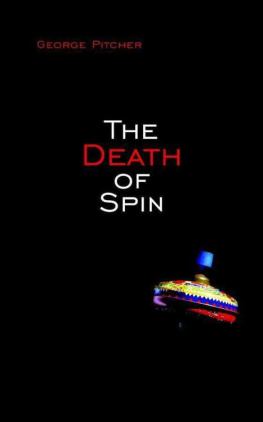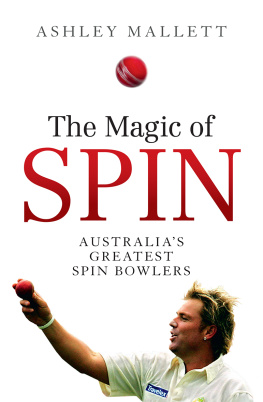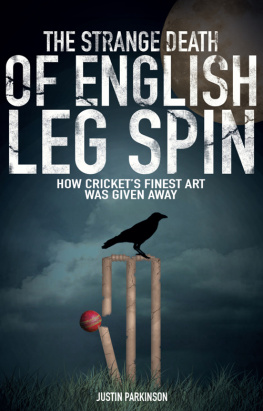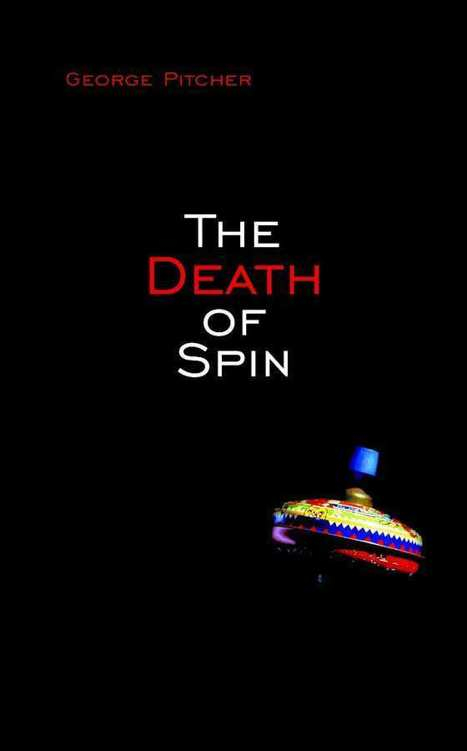Th e Death of Spin
Georg e Pitcher

Publishe d in 2003 by John Wiley & Sons Ltd, The Atrium, Southern Gate, Chichester, West Sussex PO19 8SQ, England
Telephone (44) 1243 779777
Email (for orders and customer service enquiries): csbooks@wiley.co.uk Visit our Home Page on www.wileyeurope.com or www.wiley.com
Copyright # 2003 George Pitcher
All Rights Reserved. No part of this publication may be reproduced, stored in a retrieval system or transmitted in any form or by any means, electronic, mechanical, photocopying, recording, scanning or otherwise, except under the terms of the Copyright, Designs and Patents Act 1988 or under the terms of a licence issued by the Copyright Licensing Agency Ltd, 90 Tottenham Court Road, London W1T 4LP, UK, without the permission in writing of the Publisher. Requests to the Publisher should be addressed to the Permissions Department, John Wiley & Sons Ltd, The Atrium, Southern Gate, Chichester, West Sussex PO19 8SQ, England, or emailed to permreq@wiley.co.uk, or faxed to (44) 1243 770571.
This publication is designed to provide accurate and authoritative information in regard to the subject matter covered. It is sold on the understanding that the Publisher is not engaged in rendering professional services. If professional advice or other expert assistance is required, the services of a competent professional should be sought.
George Pitcher has asserted his right under the Copyright, Designs and Patents Act 1988, to be identified as the author of this work.
Other Wiley Editorial Offices
John Wiley & Sons Inc., 111 River Street, Hoboken, NJ 07030, USA
JosseyBass, 989 Market Street, San Francisco, CA 941031741, USA
WileyVCH Verlag GmbH, Boschstr. 12, D69469 Weinheim, Germany
John Wiley & Sons Australia Ltd, 33 Park Road, Milton, Queensland 4064, Australia
John Wiley & Sons (Asia) Pte Ltd, 2 Clementi Loop #0201, Jin Xing Distripark, Singapore 129809
John Wiley & Sons Canada Ltd, 22 Worcester Road, Etobicoke, Ontario, Canada M9W 1L1
British Library Cataloguing in Publication Data
A catalogue record for this book is available from the British Library
ISBN 0470850485
Typeset in 9.5=13pt Melior by Mathematical Composition Setters Ltd, Salisbury, Wiltshire Printed and bound in Great Britain by Biddles Ltd, Guildford and Kings Lynn. This book is printed on acidfree paper responsibly manufactured from sustainable forestry in which at least two trees are planted for each one used for paper production.
T o Mobbs, who still wants to live with a writer
Content s
Index 261
Prefac e
a City desk as a young journalist on a masscirculation
 n newspaper, I was once told that I was writing a story for just six people in the financial markets who mattered. More frequently, I realised that we were writing for our colleagues and rivals in Fleet Street rather than for the readers. Like Planet Westminster, the world of journalism and communications can be both metropolitan and parochial and we in it need to be alert to the dangers of retelling stories to each other. I have tried not to adopt that mentality in writing this book, partly because this is a book for the lay reader, who nevertheless may be an interested observer of the culture we call spin, and partly because my editor wouldnt let me. So I trust that the obvious injokes and pointscoring have been excised. But the difference between an illuminating anecdote and being a medialuvvy is a fine one, so I hope readers will appreciate that its the world I know and forgive me for the inwardlooking nature that is its characteristic. A further implication of an insider writing a book like this is that it is necessarily subjective. It is neither a howtospin handbook, nor pretends to be an exhaustive contemporary history of spinculture. So you wont be told how to do it and there are some popular figures missing that I think are either not relevant to the subject of the book or boring. That said, most books on this subject have either been dry and worthy management or political manuals or scary exposes of highprofile figures. I hope that what follows is neither but rather a guided tour through the ratruns below and beside the corridors of media, industrial and political power as the spinculture of our times rose and fell. If nothing else, it might explain to a number of bewildered relatives where weve all been these past 20 years or so.
n newspaper, I was once told that I was writing a story for just six people in the financial markets who mattered. More frequently, I realised that we were writing for our colleagues and rivals in Fleet Street rather than for the readers. Like Planet Westminster, the world of journalism and communications can be both metropolitan and parochial and we in it need to be alert to the dangers of retelling stories to each other. I have tried not to adopt that mentality in writing this book, partly because this is a book for the lay reader, who nevertheless may be an interested observer of the culture we call spin, and partly because my editor wouldnt let me. So I trust that the obvious injokes and pointscoring have been excised. But the difference between an illuminating anecdote and being a medialuvvy is a fine one, so I hope readers will appreciate that its the world I know and forgive me for the inwardlooking nature that is its characteristic. A further implication of an insider writing a book like this is that it is necessarily subjective. It is neither a howtospin handbook, nor pretends to be an exhaustive contemporary history of spinculture. So you wont be told how to do it and there are some popular figures missing that I think are either not relevant to the subject of the book or boring. That said, most books on this subject have either been dry and worthy management or political manuals or scary exposes of highprofile figures. I hope that what follows is neither but rather a guided tour through the ratruns below and beside the corridors of media, industrial and political power as the spinculture of our times rose and fell. If nothing else, it might explain to a number of bewildered relatives where weve all been these past 20 years or so.
George Pitcher
Acknowledgement s
 nyon e who has ever been in journalism knows that research amounts to a visit to the clippings library true, the source may be online now, but it amounts to the same thing. The equivalent for communications professionals is the ability to plunder the intellectual property of ones colleagues. In this regard, I am blessed indeed. I cofounded our consultancy a decade ago with Charles StewartSmith and since have been privileged to plagiarise one of the finest communications minds of his generation. I am also in debt to my partners for their variety of political, industrial and commercial insights they are Amy Kroviak, Ben Rich, Andrew Sharkey, Chris Springham, Douglas Trainer, Simon Whale and David Wheeldon. Further insights have come from my governing board, chaired by John Booth, and I thank John Preston and Nick Taylor for wisdom. Further thanks: All the colleagues who have covered my back at the office while I wrote this book, especially Jon Bennett, Jo Bird, Daniel Guthrie, Emma Leeds and their account teams. Despo Ptohopoulos was endlessly tolerant and supportive of me in the field, Bonnie Dixon researched and helped me to remember what I was doing in the Eighties and Christina Lau kept me wired with the patience of angels. My colleagues at Financial Issues, Jonathan Dewe, Clive Horwood and Adrian Thomas, educated me in the fixedincome markets, while Richard Bridges made sense of equities. Importantly, if anonymously, many figures in Westminster and Whitehall spoke to me and trusted me with what they said you know who you are. Infonics brainboxes taught me all I need to know about corporate exposure to the internet Mark Bunting, Roy Lipski and Orlando Plunket Greene. Tom Bentley, James Wilsdon and Eddie Gibb at Demos for encouragement, a platform, a pamphlet and a whole lot more. Peter Wilson of Delta Pearl and Strategos thought of questions about corporate communications that nobody else had and one day, albeit briefly, made me a visiting lecturer at INSEAD. Then, substantially, theres the team at Wiley that made it happen my editor Sally Smith, Julia Lampam, Tracy Clayton, Amie Tibble, Sandra Heath and Benjamin Earl; plus Martin Key for the copy edit. And, finally, if youve just bought this book, or perhaps just borrowed it, thankyou.
nyon e who has ever been in journalism knows that research amounts to a visit to the clippings library true, the source may be online now, but it amounts to the same thing. The equivalent for communications professionals is the ability to plunder the intellectual property of ones colleagues. In this regard, I am blessed indeed. I cofounded our consultancy a decade ago with Charles StewartSmith and since have been privileged to plagiarise one of the finest communications minds of his generation. I am also in debt to my partners for their variety of political, industrial and commercial insights they are Amy Kroviak, Ben Rich, Andrew Sharkey, Chris Springham, Douglas Trainer, Simon Whale and David Wheeldon. Further insights have come from my governing board, chaired by John Booth, and I thank John Preston and Nick Taylor for wisdom. Further thanks: All the colleagues who have covered my back at the office while I wrote this book, especially Jon Bennett, Jo Bird, Daniel Guthrie, Emma Leeds and their account teams. Despo Ptohopoulos was endlessly tolerant and supportive of me in the field, Bonnie Dixon researched and helped me to remember what I was doing in the Eighties and Christina Lau kept me wired with the patience of angels. My colleagues at Financial Issues, Jonathan Dewe, Clive Horwood and Adrian Thomas, educated me in the fixedincome markets, while Richard Bridges made sense of equities. Importantly, if anonymously, many figures in Westminster and Whitehall spoke to me and trusted me with what they said you know who you are. Infonics brainboxes taught me all I need to know about corporate exposure to the internet Mark Bunting, Roy Lipski and Orlando Plunket Greene. Tom Bentley, James Wilsdon and Eddie Gibb at Demos for encouragement, a platform, a pamphlet and a whole lot more. Peter Wilson of Delta Pearl and Strategos thought of questions about corporate communications that nobody else had and one day, albeit briefly, made me a visiting lecturer at INSEAD. Then, substantially, theres the team at Wiley that made it happen my editor Sally Smith, Julia Lampam, Tracy Clayton, Amie Tibble, Sandra Heath and Benjamin Earl; plus Martin Key for the copy edit. And, finally, if youve just bought this book, or perhaps just borrowed it, thankyou.
Introductio n
 hing s could only get better in 1997, or so the triumphant supporters of the UK Labour Party believed as they celebrated their first election victory for nearly 18 years. Western stockmarkets were gripped by what the chairman of the Federal Reserve called an irrational exuberance that was going to push the longest bull market in history into the new millennium. Bill Clintons Democrats had been, surprisingly, returned despite his peccadilloes. There were only distant rumblings of a Millennium Bug that might wreak havoc on the worlds computers. There was no global war on terror. In the UK the Tories had been marginalised, the Queen Mother was still looking forward to the celebrations of her 100 t h birthday , Peter Mandelson was Minister Without Portfolio at the Cabinet Office and David Beckham had not yet been sent off against Argentina. Enron was a highly successful energytrading company and business was booming. It is my contention that the West was also gripped by a spinculture that in the UK had developed in the early days of Margaret Thatchers premiership and in which the appearance of things enjoyed precedence over their content. The new imperialists and colonisers were the global brands, whether the background fabric of society engineered by CocaCola or Microsoft, or the fabric itself in the shape of Nike, Benetton or Lacoste what they wore defined the masses and was a mark of success. Failure for British generations the honourable mark of the heroic underdog became a mark of, well, failure and loser moved into the international English lexicon as an expression of casual contempt, rather than of respect and pity. Winning at all costs, whether in business or in politics, became the new credo. It defined New Labour, the new whitehats, and pushed the equity markets. It was a culture that venerated appearance and promoted position over priority. This book is about the rise and fall of that spinculture.
hing s could only get better in 1997, or so the triumphant supporters of the UK Labour Party believed as they celebrated their first election victory for nearly 18 years. Western stockmarkets were gripped by what the chairman of the Federal Reserve called an irrational exuberance that was going to push the longest bull market in history into the new millennium. Bill Clintons Democrats had been, surprisingly, returned despite his peccadilloes. There were only distant rumblings of a Millennium Bug that might wreak havoc on the worlds computers. There was no global war on terror. In the UK the Tories had been marginalised, the Queen Mother was still looking forward to the celebrations of her 100 t h birthday , Peter Mandelson was Minister Without Portfolio at the Cabinet Office and David Beckham had not yet been sent off against Argentina. Enron was a highly successful energytrading company and business was booming. It is my contention that the West was also gripped by a spinculture that in the UK had developed in the early days of Margaret Thatchers premiership and in which the appearance of things enjoyed precedence over their content. The new imperialists and colonisers were the global brands, whether the background fabric of society engineered by CocaCola or Microsoft, or the fabric itself in the shape of Nike, Benetton or Lacoste what they wore defined the masses and was a mark of success. Failure for British generations the honourable mark of the heroic underdog became a mark of, well, failure and loser moved into the international English lexicon as an expression of casual contempt, rather than of respect and pity. Winning at all costs, whether in business or in politics, became the new credo. It defined New Labour, the new whitehats, and pushed the equity markets. It was a culture that venerated appearance and promoted position over priority. This book is about the rise and fall of that spinculture.
















 n newspaper, I was once told that I was writing a story for just six people in the financial markets who mattered. More frequently, I realised that we were writing for our colleagues and rivals in Fleet Street rather than for the readers. Like Planet Westminster, the world of journalism and communications can be both metropolitan and parochial and we in it need to be alert to the dangers of retelling stories to each other. I have tried not to adopt that mentality in writing this book, partly because this is a book for the lay reader, who nevertheless may be an interested observer of the culture we call spin, and partly because my editor wouldnt let me. So I trust that the obvious injokes and pointscoring have been excised. But the difference between an illuminating anecdote and being a medialuvvy is a fine one, so I hope readers will appreciate that its the world I know and forgive me for the inwardlooking nature that is its characteristic. A further implication of an insider writing a book like this is that it is necessarily subjective. It is neither a howtospin handbook, nor pretends to be an exhaustive contemporary history of spinculture. So you wont be told how to do it and there are some popular figures missing that I think are either not relevant to the subject of the book or boring. That said, most books on this subject have either been dry and worthy management or political manuals or scary exposes of highprofile figures. I hope that what follows is neither but rather a guided tour through the ratruns below and beside the corridors of media, industrial and political power as the spinculture of our times rose and fell. If nothing else, it might explain to a number of bewildered relatives where weve all been these past 20 years or so.
n newspaper, I was once told that I was writing a story for just six people in the financial markets who mattered. More frequently, I realised that we were writing for our colleagues and rivals in Fleet Street rather than for the readers. Like Planet Westminster, the world of journalism and communications can be both metropolitan and parochial and we in it need to be alert to the dangers of retelling stories to each other. I have tried not to adopt that mentality in writing this book, partly because this is a book for the lay reader, who nevertheless may be an interested observer of the culture we call spin, and partly because my editor wouldnt let me. So I trust that the obvious injokes and pointscoring have been excised. But the difference between an illuminating anecdote and being a medialuvvy is a fine one, so I hope readers will appreciate that its the world I know and forgive me for the inwardlooking nature that is its characteristic. A further implication of an insider writing a book like this is that it is necessarily subjective. It is neither a howtospin handbook, nor pretends to be an exhaustive contemporary history of spinculture. So you wont be told how to do it and there are some popular figures missing that I think are either not relevant to the subject of the book or boring. That said, most books on this subject have either been dry and worthy management or political manuals or scary exposes of highprofile figures. I hope that what follows is neither but rather a guided tour through the ratruns below and beside the corridors of media, industrial and political power as the spinculture of our times rose and fell. If nothing else, it might explain to a number of bewildered relatives where weve all been these past 20 years or so. nyon e who has ever been in journalism knows that research amounts to a visit to the clippings library true, the source may be online now, but it amounts to the same thing. The equivalent for communications professionals is the ability to plunder the intellectual property of ones colleagues. In this regard, I am blessed indeed. I cofounded our consultancy a decade ago with Charles StewartSmith and since have been privileged to plagiarise one of the finest communications minds of his generation. I am also in debt to my partners for their variety of political, industrial and commercial insights they are Amy Kroviak, Ben Rich, Andrew Sharkey, Chris Springham, Douglas Trainer, Simon Whale and David Wheeldon. Further insights have come from my governing board, chaired by John Booth, and I thank John Preston and Nick Taylor for wisdom. Further thanks: All the colleagues who have covered my back at the office while I wrote this book, especially Jon Bennett, Jo Bird, Daniel Guthrie, Emma Leeds and their account teams. Despo Ptohopoulos was endlessly tolerant and supportive of me in the field, Bonnie Dixon researched and helped me to remember what I was doing in the Eighties and Christina Lau kept me wired with the patience of angels. My colleagues at Financial Issues, Jonathan Dewe, Clive Horwood and Adrian Thomas, educated me in the fixedincome markets, while Richard Bridges made sense of equities. Importantly, if anonymously, many figures in Westminster and Whitehall spoke to me and trusted me with what they said you know who you are. Infonics brainboxes taught me all I need to know about corporate exposure to the internet Mark Bunting, Roy Lipski and Orlando Plunket Greene. Tom Bentley, James Wilsdon and Eddie Gibb at Demos for encouragement, a platform, a pamphlet and a whole lot more. Peter Wilson of Delta Pearl and Strategos thought of questions about corporate communications that nobody else had and one day, albeit briefly, made me a visiting lecturer at INSEAD. Then, substantially, theres the team at Wiley that made it happen my editor Sally Smith, Julia Lampam, Tracy Clayton, Amie Tibble, Sandra Heath and Benjamin Earl; plus Martin Key for the copy edit. And, finally, if youve just bought this book, or perhaps just borrowed it, thankyou.
nyon e who has ever been in journalism knows that research amounts to a visit to the clippings library true, the source may be online now, but it amounts to the same thing. The equivalent for communications professionals is the ability to plunder the intellectual property of ones colleagues. In this regard, I am blessed indeed. I cofounded our consultancy a decade ago with Charles StewartSmith and since have been privileged to plagiarise one of the finest communications minds of his generation. I am also in debt to my partners for their variety of political, industrial and commercial insights they are Amy Kroviak, Ben Rich, Andrew Sharkey, Chris Springham, Douglas Trainer, Simon Whale and David Wheeldon. Further insights have come from my governing board, chaired by John Booth, and I thank John Preston and Nick Taylor for wisdom. Further thanks: All the colleagues who have covered my back at the office while I wrote this book, especially Jon Bennett, Jo Bird, Daniel Guthrie, Emma Leeds and their account teams. Despo Ptohopoulos was endlessly tolerant and supportive of me in the field, Bonnie Dixon researched and helped me to remember what I was doing in the Eighties and Christina Lau kept me wired with the patience of angels. My colleagues at Financial Issues, Jonathan Dewe, Clive Horwood and Adrian Thomas, educated me in the fixedincome markets, while Richard Bridges made sense of equities. Importantly, if anonymously, many figures in Westminster and Whitehall spoke to me and trusted me with what they said you know who you are. Infonics brainboxes taught me all I need to know about corporate exposure to the internet Mark Bunting, Roy Lipski and Orlando Plunket Greene. Tom Bentley, James Wilsdon and Eddie Gibb at Demos for encouragement, a platform, a pamphlet and a whole lot more. Peter Wilson of Delta Pearl and Strategos thought of questions about corporate communications that nobody else had and one day, albeit briefly, made me a visiting lecturer at INSEAD. Then, substantially, theres the team at Wiley that made it happen my editor Sally Smith, Julia Lampam, Tracy Clayton, Amie Tibble, Sandra Heath and Benjamin Earl; plus Martin Key for the copy edit. And, finally, if youve just bought this book, or perhaps just borrowed it, thankyou. hing s could only get better in 1997, or so the triumphant supporters of the UK Labour Party believed as they celebrated their first election victory for nearly 18 years. Western stockmarkets were gripped by what the chairman of the Federal Reserve called an irrational exuberance that was going to push the longest bull market in history into the new millennium. Bill Clintons Democrats had been, surprisingly, returned despite his peccadilloes. There were only distant rumblings of a Millennium Bug that might wreak havoc on the worlds computers. There was no global war on terror. In the UK the Tories had been marginalised, the Queen Mother was still looking forward to the celebrations of her 100 t h birthday , Peter Mandelson was Minister Without Portfolio at the Cabinet Office and David Beckham had not yet been sent off against Argentina. Enron was a highly successful energytrading company and business was booming. It is my contention that the West was also gripped by a spinculture that in the UK had developed in the early days of Margaret Thatchers premiership and in which the appearance of things enjoyed precedence over their content. The new imperialists and colonisers were the global brands, whether the background fabric of society engineered by CocaCola or Microsoft, or the fabric itself in the shape of Nike, Benetton or Lacoste what they wore defined the masses and was a mark of success. Failure for British generations the honourable mark of the heroic underdog became a mark of, well, failure and loser moved into the international English lexicon as an expression of casual contempt, rather than of respect and pity. Winning at all costs, whether in business or in politics, became the new credo. It defined New Labour, the new whitehats, and pushed the equity markets. It was a culture that venerated appearance and promoted position over priority. This book is about the rise and fall of that spinculture.
hing s could only get better in 1997, or so the triumphant supporters of the UK Labour Party believed as they celebrated their first election victory for nearly 18 years. Western stockmarkets were gripped by what the chairman of the Federal Reserve called an irrational exuberance that was going to push the longest bull market in history into the new millennium. Bill Clintons Democrats had been, surprisingly, returned despite his peccadilloes. There were only distant rumblings of a Millennium Bug that might wreak havoc on the worlds computers. There was no global war on terror. In the UK the Tories had been marginalised, the Queen Mother was still looking forward to the celebrations of her 100 t h birthday , Peter Mandelson was Minister Without Portfolio at the Cabinet Office and David Beckham had not yet been sent off against Argentina. Enron was a highly successful energytrading company and business was booming. It is my contention that the West was also gripped by a spinculture that in the UK had developed in the early days of Margaret Thatchers premiership and in which the appearance of things enjoyed precedence over their content. The new imperialists and colonisers were the global brands, whether the background fabric of society engineered by CocaCola or Microsoft, or the fabric itself in the shape of Nike, Benetton or Lacoste what they wore defined the masses and was a mark of success. Failure for British generations the honourable mark of the heroic underdog became a mark of, well, failure and loser moved into the international English lexicon as an expression of casual contempt, rather than of respect and pity. Winning at all costs, whether in business or in politics, became the new credo. It defined New Labour, the new whitehats, and pushed the equity markets. It was a culture that venerated appearance and promoted position over priority. This book is about the rise and fall of that spinculture.